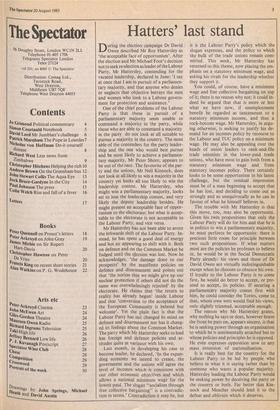Hatters' last stand
During the election campaign Dr David Owen described Mr Roy Hattersley as 'the acceptable face of opportunism'. After the election and Mr Michael Foot's decision not to seek re-election as leader of the Labour Party, Mr Hattersley, contending for the vacated leadership, declared in June: 'I say at once that 1 am in pursuit of a parliamen- tary majority, and that anyone who denies or neglects that objective betrays the men and women who look to a Labour govern- ment for protection and assistance.'
One of the chief problems of the Labour Party is that those in pursuit of a parliamentary majority seem unable to command a majority in the party, while those who are able to command a majority in the party do not Wok at all suitable to pursue a majority in the country. The most able'of the contenders for the party leader- ship and the one who would best pursue and be most likely to achieve a parliamen- tary majority, Mr Peter Shore, appears to be out of the race. The favourite of the par- ty and the unions, Mr Neil Kinnock, does not look at all likely to win a majority in the country yet looks all too likely to win the leadership contest. Mr Hattersley, who might win a parliamentary majority, looks set to lose the leadership contest, and very likely the deputy leadership besides. He might present an acceptable face of oppor- tunism to the electorate; but what is accep- table to the electorate is not acceptable to the Labour Party, and vice versa.
Mr Hattersley has not been able to arrest the leftwards shift of the Labour Party. In- stead, he has spent a good deal of energy and hot air appearing to shift with it. Both on defence and on the Common Market he fudged until the ejection was lost. Now he acknowledges, 'the damage done to our prospects' by the manifesto policies on defence and disarmament and points out that 'the notion that we might give up our nuclear protection if others did not do the same was overwhelmingly rejected' by the electorate. He claims that 'the return to reality has already begun' inside Labour and that 'conversion to the acceptance of the European Community is belated but welcome'. Yet the plain fact is that the Labour Party has .not changed its mind on defence and disarmament nor has it chang- ed its feelings about the Common Market. 'The party which Mr Hattersley seeks to lead has foreign and defence policies and at- titudes quite at variance with his own.
Last month, in developing his case to become leader, he declared, 'In the expan- ding economy we intend to create, the government and the unions will agree the level of incomes which is consistent with our other economic objectives and which allows a national minimum wage for the lowest paid. The slogan "socialism through free collective bargaining" is a contradic- tion in terms.' Contradiction it may be, but it is the Labour Party's policy which the slogan expresses, and the policy to which the bulk of the trade unions remain com- mitted. This week, Mr Hattersley has returned to this theme, now placing the em- phasis on a statutory minimum wage, and asking his rivals for the leadership whether they support it.
You could, of course, have a minimum wage and free collective bargaining on top of it; there is no reason why not; it could in- deed be argued that that is more or less what we have now, if unemployment benefit be regarded as tantamount to a statutory minimum income, and thus a rock-bottom wage. Mr Hattersley, in argu- ing otherwise, is seeking to justify his de- mand for an incomes policy by recourse to the Labour and TUC policy on a minimum wage. He may also be appealing over the heads of union leaders to rank-and-file trade unionists in the lower-paid trade unions, who have most to gain both from a statutory minimum wage and from statutory incomes policy. There certainly looks to be some opportunism in his latest challenge, but the residual impression must be of a man beginning to accept that he has lost, and deciding to come out as strongly and as unequivocally as he can in favour of what he himself believes in.
The trouble with Mr Hattersley is that this move, too, may also be opportunist. Given his twin propositions that only the Labour Party will do for him and that he is in politics to win a parliamentary majority, he must perforce be opportunist: there is precious little room for principle between two such propositions. If what matters most are the policies he professes to believe in, he would be in the Social Democratic Party already: his views and those of Dr David Owen are virtually indistinguishable except when he chooses to obscure his own. If loyalty to the Labour Party is to come first, he would do better to accept, or pre- tend to accept, its policies. If securing a parliamentary majority comes first with him, he could consider the Tories, come to, that, whose own wets would find his views, only slightly trimmed, acceptable enough.
The reason why Mr Hattersley grates, why nothing he says or does, however brave the front he puts on, appears sincere, is that he is seeking power through an organisation to which he is sentimentally attached but to whose policies and principles he is opposed. He even expresses opposition now to any mass extension of nationalisation.
It is really best for the country for the Labour Party to be led by people who believe in what it is saying rather than by someone who wants a popular majority. Hattersley leading the Labour Party would be seeking power by deceiving the party or the country or both. Far better that Kin- nock and Meacher should lead it to the defeat and oblivion which it deserves.


































 Previous page
Previous page